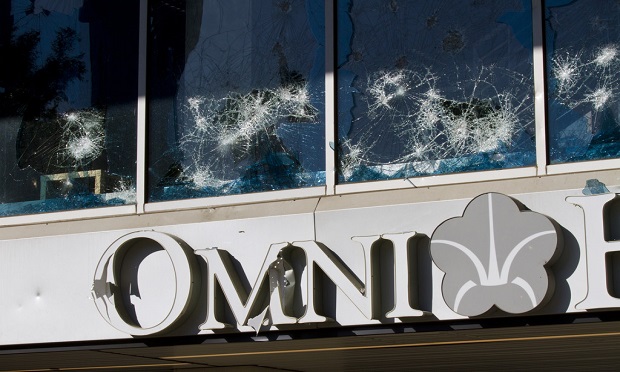 The Omni Hotel in Atlanta was damagedafter a night of violent protests, rioting and looting on Friday,May 29, 2020. (John Disney for ALM Media)
The Omni Hotel in Atlanta was damagedafter a night of violent protests, rioting and looting on Friday,May 29, 2020. (John Disney for ALM Media)
As much of the United States convulses in response to the deathof George Floyd, an unarmed black man in the custody of Minneapolispolice officers, it's some comfort to know that property damagecaused by rioting, civil commotion and vandalism are covered understandard insurance policies, says Loretta Worters, vice president,media relations for the Insurance Information Institute (I.I.I.).
|Here is an overview of the different kinds of policies andcoverage that may be involved in any claims. Insured that don'thave the right kind of coverage now can use this information todiscuss options with an insurance agent or broker.
|Damage to vehicles
Automobiles are covered under the optionalcomprehensive portion of an auto policy, Worters explains. Thisprovides reimbursement for damage to the vehicle and its contentscaused by fire, falling objects, vandalism or rioting.
|"Comprehensive coverage will also reimburse you if yourwindshield is cracked or shattered," she adds. Some companies offerglass coverage without a deductible. Approximately three-quartersof U.S. drivers chose to buy this optional coverage as part oftheir auto insurance policy.
|Damaged buildings and personal property
Standard homeowners policies will cover damage to the propertycaused by fire, an explosion, a riot or civil commotion, vandalismor malicious mischief. This would include coverage to the structureof the home, as well as any personal possessions.
|"If you can't live at your home because it was damaged by aninsured disaster," Worters says, "standard home (and rentersinsurance policies) provide coverage for additional living expenses(ALE), which pays the costs of living away from home. ALE covershotel bills, restaurant meals, and other expenses incurred whileyour home is being rebuilt."
|Rioting, civil commotion, and vandalism are also covered perilsunder virtually all business owners and commercial insuranceproperty policies ― both named perils and "all risk" policies.
|Damage to windows, doors, light fixtures and other items thatare part of a building should be covered under the buildingproperty coverage included in the policy. "Glass is usually part ofcovered property and built into base rates as long as it's part ofa building or structure (i.e., store windows and plate glass onoffice fronts)," Worters notes. "However, there could be somepolicies that need special glass endorsements."
|Business owners should check with their insurer. Furniture,liquor, glassware office supplies, computers, machinery ― basicallyeverything except for the building itself that was damaged orstolen should qualify for coverage under the business owner'spersonal property coverage.
|Business income coverage
Business income insurance typically includes civil authoritycoverage, which provides loss of income that occurs because accessto your premises has been prohibited by civil authority, such as agovernment entity.
|"Access must be prohibited due to damage by a covered peril toproperty," Worters says, "not located at your premises."Civil authority insurance covers income lost during a limitedperiod of time, typically four weeks. You can extend this timeperiod by paying an additional premium.
|Companies that incur extra expenses to continue operations whilethe insured premises is being repaired or replaced may be insuredunder the extra expense coverage provided in most propertypolicies. Typically, this coverage is afforded for costs incurredto reduce a covered loss of business income.
|Businesses that are forced to suspend operations or limit hoursdue to rioting, vandalism or civil commotion and have coverage forthe loss of income under business income insurance (also known asbusiness interruption) will be covered.
|"Coverage is typically triggered if there is direct physicaldamage to the premises," Worters explains. But, business incomecoverage is often subject to a waiting period (a type ofdeductible). The waiting period applies to income losses, includingthose insured under civil authority coverage. It does not apply toextra expense losses. A typical waiting period is 72 hours.
|Know your BOP policies
A business owner's policy (BOP) often combines property,liability and business interruption coverages for small to midsizebusinesses, Worters says.
|Coverage purchased as a package is generally less expensive thanif purchased through separate insurance policies and can helpensure proper underlying limits are in place. "Normally, companieswith 100 employees or fewer and revenues of up to about $5 millionor less are candidates for a BOP," she adds.
|Some types of businesses, such as restaurants, may not beeligible for a BOP because of the specific risks inherent in thebusiness, and they may need to consider buying the individualcoverages separately.
|An endorsement or rider can be added to a commercial propertyinsurance policy that will extend coverage to business interruptionlosses. Only 40% of businesses have business interruption coveragethrough a standalone policy or BOP, and 44% of small businesseshave never had insurance, according to a recent survey by Next Insurance.
|How much a BOP costs depends on a number of factors, includingyour:
- Industry,
- Number of employees,
- Amount of coverage, and
- Prior claims experience.
The price of the policy can also vary depending on yourlocation. For example, if the business is in an area with a higherrisk of hurricanes, the cost may increase. A restaurant might havehigher premiums than a real estate agency, for example, because ofthe greater risk of fire.
|Civil authority actions
Remember that civil authorities can bar you from entering yourbusiness in situations that are not related to protests, riots orcivil unrest.
|After a heavy rain with widespread flooding, local municipalauthorities may not allow you to return to your business or homeuntil the floodwaters recede. If there is a fire, the fireinspector may require you to stay out of the building until it hasbeen deemed safe, which could take days or weeks.
|On top of the business interruption claims for shutdowns due tothe coronavirus, claims for damages or closures due to the actionsof civil authorities are likely to increase. According to onereport from a business owner on social media, his carrier haspreemptively said there is no coverage for damages from violenceafter a protest in his area. These claims, like the businessinterruption claims, are sure to be complicated and lead tolitigation.
|Rosalie Donlon is the editor in chief ofALM's insurance and tax publications, including NU Property &Casualty magazine and NU PropertyCasualty360.com. You can contacther at [email protected].
|READ MORE:
Complete your profile to continue reading and get FREE access to BenefitsPRO, part of your ALM digital membership.
Your access to unlimited BenefitsPRO content isn’t changing.
Once you are an ALM digital member, you’ll receive:
- Critical BenefitsPRO information including cutting edge post-reform success strategies, access to educational webcasts and videos, resources from industry leaders, and informative Newsletters.
- Exclusive discounts on ALM, BenefitsPRO magazine and BenefitsPRO.com events
- Access to other award-winning ALM websites including ThinkAdvisor.com and Law.com
Already have an account? Sign In
© 2024 ALM Global, LLC, All Rights Reserved. Request academic re-use from www.copyright.com. All other uses, submit a request to [email protected]. For more information visit Asset & Logo Licensing.








